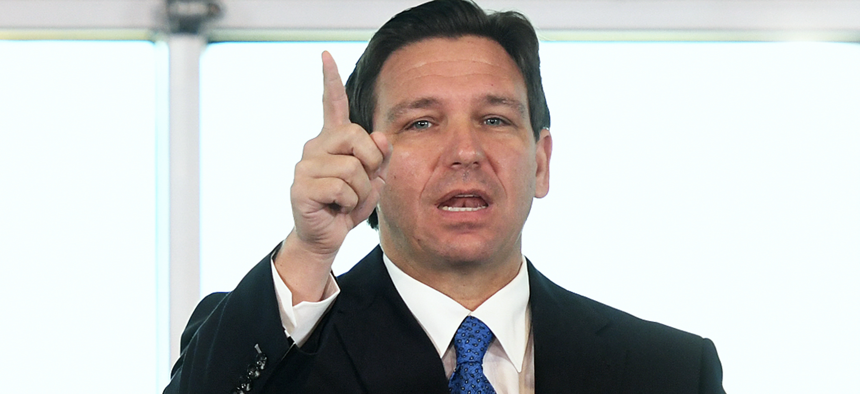Opinion
Bill Cotterell: Governors – including Ron DeSantis – shouldn’t enjoy this kind of privilege
A Tallahassee judge created executive privilege for the governor in state law, where none had before been recognized.

DeSantis speaks at a press conference to announce the Moving Florida Forward initiative at the SunTrax Test Facility in Auburndale. Photo by Paul Hennessy/SOPA Images/LightRocket via Getty Images
No matter what kind of “sunshine” laws Florida adopts, no matter what the state constitution says, open government is ultimately a state of mind that politicians will observe – or ignore – as it suits them.
When running for office, they all promise to be totally transparent and accountable. Many have made a show of removing doors from their suites in the Capitol, or livestreaming meetings on the internet. But when there are game plans to be made, or strategic traps to be laid, any politician crafty enough to rise higher than a high school student council knows how to get things done without a lot of people watching.
They all do it. Gov. Ron DeSantis, riding a near-60% public vote of confidence in his reelection, is a little more cagey than most. And he’s got the wind at his back, thanks to a favorable court ruling being appealed by some Florida media, among others.
Circuit Judge Angela Dempsey last month recognized an executive privilege the governor’s lawyers claimed for him in an obscure civil dispute over identification of who advises DeSantis on state Supreme Court appointments. It’s significant that neither Florida statutes nor our Constitution specifies that chief executives may withhold information from the public just because they feel like it.
Dempsey’s ruling came in a suit filed by an anonymous citizen who wants the names of what DeSantis referred to as “six or seven pretty big legal conservative heavyweights” who interviewed prospective Supreme Court appointees on his behalf, prior to his own chats with those folks. (Incidentally, the plaintiff’s anonymity is a logical anomaly: If you’re defending openness, why not identify yourself?)
The governor’s attorneys said in legal filings, “The interest in maintaining the confidentiality of the executive is vital to the public, as it fosters informed and sound gubernatorial deliberations and decision making.”
Well, so would secret Cabinet meetings. So would closed courtrooms, or rump sessions of the Legislature held down the street at the Governors Club. The comfort and convenience of elected officers are not the purpose of Florida’s vaunted Government in the Sunshine statutes.
Is it pro bono publico that Floridians shouldn’t be told who DeSantis consults when deciding which Federalist Society activist gets the next black robe? Would some great misfortune befall the republic if Joe Taxpayer knows? Why shouldn’t various experts who help DeSantis fill important vacancies in state offices get a reporter’s call, asking what they discussed?
And it’s not just the press. The open meeting and public records laws can be invoked by any of 20 million-some folks in Florida. Reporters just seem to make the most frequent use of them.
Our state has a mostly favorable national reputation for open government. It’s considered so important (in theory, if not practice) that amending those laws by adding exemptions requires 2/3 votes in the House and Senate. Official notices often carry bold-faced warnings that Florida’s document laws are very broad, so correspondence is subject to public review.
And our laws permit a fair dose of secrecy, including many reasonable exemptions. No one is suggesting the state publish names of police informants. Just recently, names of applicants for university presidencies were shielded at initial stages, to attract more applicants who might shy away if their current bosses could find out they’re looking for another job.
Some news organizations plan to join the anonymous plaintiff's appeal of Dempsey’s ruling at the 1st District Court of Appeal, where the losing side will probably try to get the case before the Florida Supreme Court. But this executive-privilege assertion is more ominous than any legal exemption debated in the Legislature, heard in public committee meetings and signed into law by a governor.
What DeSantis seeks is carte blanche to decide, for whatever reasons governors wish, to withhold relevant information just because they don’t feel like disclosing it.
Bill Cotterell is a retired Capitol reporter for United Press International and the Tallahassee Democrat. He can be reached at bcotterell@cityandstatefl.com
NEXT STORY: Opinion: Florida shouldn't be different when it comes to death penalty
